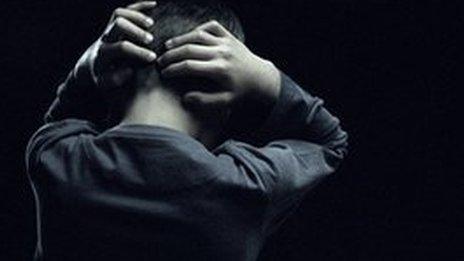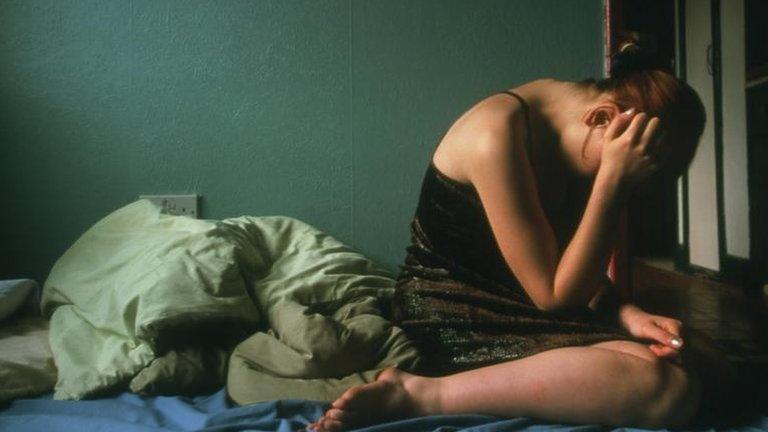Keir Starmer heads Labour's victim treatment review
- Published
Keir Starmer: "This is about a real and significant shift forward now by putting into law victims' rights for the first time"
Former chief prosecutor Keir Starmer is to advise Labour on the best way to protect rape victims and abused children from harrowing questioning during court cases.
He said it was a "golden opportunity" to change the law, while Labour called the current code of conduct followed by barristers "toothless".
The review follows several complaints about the questioning of crime victims.
The government said it had already "considerably improved" the system.
Violinist Frances Andrade killed herself after giving evidence against former teacher Michael Brewer, who was later found guilty of indecently assaulting his pupil.
Concerns were also raised about how the child victims of a paedophile ring in Oxfordshire were questioned, leading to calls for pre-recorded cross-examinations and barristers to undergo compulsory training.
'Victims' law'
Mr Starmer, who stood down as director of public prosecutions earlier this year, said he would advise Labour on introducing legislation - if the party won power at the 2015 general election - to give greater protection to vulnerable witnesses in court.
He acknowledged that the current government was addressing the treatment of victims but insisted that a "faster shift" was needed to enshrine their rights in law.
He told BBC Radio 4's Today programme: "The more vulnerable you are as a victim or witness, the less able our criminal justice system is to protect you."
"Most victims, particularly vulnerable victims, don't have the confidence to come forward. Most of them have a pretty awful journey through the court process and nearly all of them, at the end of it, say they will never do it again."
'Troubling case'
Referring to the treatment in court of celebrity chef Nigella Lawson during the recent trial of her two former assistants, Mr Starmer said it had been a "troubling case".
"In any courtroom up and down England and Wales you will have similar experiences day in, day out," he said.
"I think particularly of the child sexual abuse cases and so-called grooming cases. In those cases victims were put through a very great ordeal and so were witnesses so it is troubling.
"Our criminal justice system has been set up as a straight fight between the prosecution and defendant and victims and witnesses have had a walk on part. We need to rethink that and make sure that we do have a system fit for victims and witnesses, and we don't at the moment."
Asked about reports that his new advisory role was a prelude to a new political career with Labour, Mr Starmer said he was "considering a number of options".
The changes proposed by Mr Starmer could also see victims of crime given "minimum standards of service" and a single point of contact so they find it easier to get information about the progress of their cases.
Mr Starmer's task force also includes Labour peer Baroness Lawrence of Clarendon, whose son Stephen was murdered, and Peter Neyroud, former chief constable of Thames Valley Police and a criminologist at Cambridge University.
'Confusing and inadequate'
Shadow justice secretary Sadiq Khan said the proposals, if implemented, would give the public greater confidence in the criminal justice system.
He said: "At the moment, there are a variety of codes and charters across various government agencies which are toothless, confusing and inadequate."
Mr Khan added: "Victims represent some of society's most vulnerable people. That's why we need nothing short of a transformation if we are to deliver a criminal justice service that supports members of the public who have been innocent victims of crime through no fault of their own."
A Ministry of Justice spokesman said: "Government has considerably improved the support given to vulnerable victims and witnesses in court, including trialling pre-recorded cross examination, strengthening support for child witnesses and investigating how we might reduce the distress caused from multiple cross examination.
"We have also made sure that, for the first time, victims of the most serious crimes, and all vulnerable and intimidated victims, get vital support like pre-trial therapy and counselling."
He added: "A new victims' code introduced in December also sets out in plain English what people should expect from the moment they report a crime to the end of a trial and tells them who to demand it from if they are not offered it. It also gives victims the option to read out their personal statement and tell the court how crime has affected them for the very first time."
- Published12 December 2013

- Published10 December 2013

- Published27 August 2013
